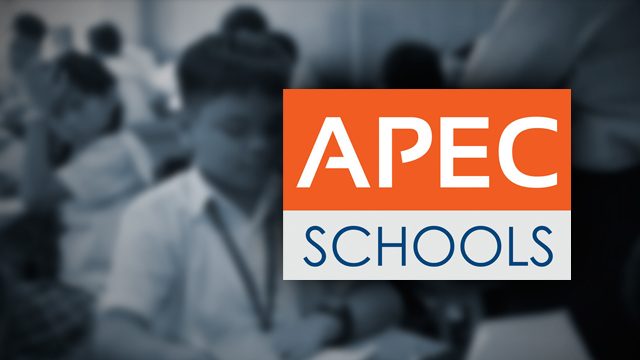SUMMARY
This is AI generated summarization, which may have errors. For context, always refer to the full article.

MANILA, Philippines – How much does quality education cost?
On a daily basis, it can be as cheap as a cellphone load, a liter of soda, or about 3 hours of the game Defense of the Ancients (DotA) in most computer shops.
At least that is what Ayala Corporation promised as it launched on Thursday, May 15, its Affordable Private Education Center (APEC) – a chain of affordable private high schools – in partnership with the Pearson Affordable Learning Fund.
The first 11 high schools are located in 5 cities of Metro Manila: Quezon City, Pasig, Marikina, Manila, and Caloocan. Some of these schools are old and refurbished ones that Ayala will now manage starting school year 2014-2015.
Except for the branch in Emilio Aguinaldo College which is set to offer Grades 7 to 9 this coming school year, the rest of the schools will open their doors only to incoming Grade 7 students for an annual tuition fee of P23,000, inclusive of use of books and computers.
This fee includes a one-time admission fee of P4,000 and 10 monthly installments of P1,900 – approximately P65/day.
This can go down to P1,490 or about P50/day with the 20% discount APEC will offer to the first 70 enrollees of each school.
“[We tell parents to] save up a little bit, invest in education, [and] their child will be better equipped with knowledge, values and skills,” APEC Sales and Marketing Director Ramy Hocson told Rappler.
Low cost private education is a growing phenomenon across the developing world such as the Indian subcontinent, Latin America, and Africa, according to an APEC briefer. (READ: PH basic education: ‘Cramming’ toward ASEAN 2015)
APEC will continue to add grade levels every year until Grade 10.
Advanced curriculum
The schools will follow the Department of Education’s K to 12 curriculum and will enhance it with international standards – an advanced curriculum developed by Pearson.
This means students will be equipped to go from basic education to professional employment.
The approach will be on participative, active learning. With a 1:40-45 teacher-student ratio, Hocson said APEC can help the students’ skills training, values formation, and knowledge development.
Students will be encouraged to speak in English as APEC believes it is the international language of commerce. The schools will also be digital both in content and delivery.
To combat bullying – a common problem in Philippine schools – the campuses are equipped with CCTV cameras, and teachers will closely supervise students. (READ: The road to a bully-free Philippines)
APEC has a target of 1,000 enrollees for school year 2014-2015. It is also looking to expand in more Metro Manila cities by 2015. (READ: Education for all by 2015? Not happening, says Unesco)
“The global demand for Filipino talent is proof that one of the Philippines’ greatest resources is its people. Ayala believes that investment in education is key to securing national competitiveness, and every Filipino’s future,” Ayala Corporation President and COO Fernando Zobel de Ayala said in a statement Thursday.
“Our vision is to provide affordable, world-quality education that can allow every student to achieve his or her full potential,” he added. – Rappler.com
Add a comment
How does this make you feel?
There are no comments yet. Add your comment to start the conversation.